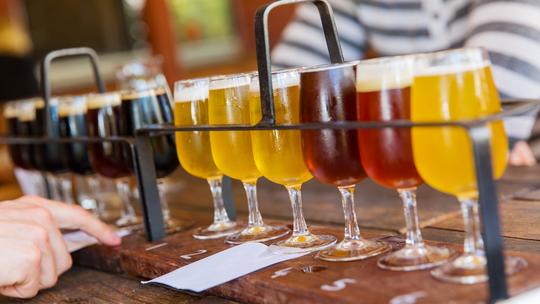
People have become super serious about their beer. Microbreweries continue to pop up on practically every corner; major brands are continuously trying to outdo each other with special batches; and beer enthusiasts are giving it a go and fermenting jugs on jugs in their own basements.
With all of this brewing about, not many people have stopped and thought about how much mash - the barley and other grains temporarily used in the beer-making process - is going to waste. Except for Colin McAlpine, a student at Northeastern, who’s found a tasty way to recycle perfectly good spent grain.
Enter McAlpine’s venture, Beantown Brew Mill. The startup, which just took third place at last week’s Husky Startup Challenge, is hoping to take the spent grain used by craft breweries, dry it, grind it into flour and sell it to bakers so it can be made into treats.
Being resourceful post-brewing
McApline was inspired by his hometown of Portland, Oregon, where craft beer flows freely. As soon as he turned 21 (he made a point to mention that part in the interview) he began to sample all of the beer the city had to offer. It led to him brewing his own beer at home, which is when he noticed how much grain he was throwing away.
“I felt wasteful, especially coming from a resourceful family,” McAlpine explained. “I was throwing away pounds and pounds of malt, so I started to research and experiment with ways to reuse it. There are a lot of different uses, but flour is one that could reach people everywhere.”
Bigger breweries produce so much grain waste that nearby farmers usually come to take it off their hands, using it for animal feed or fertilizers. However, microbreweries - which are into a still making about 1,000 pounds of spent grain each week - don’t always have people knocking on their doors wanting to haul away their wasted mash.
Ultimately, these smaller breweries have no choice but to throw away literal tons of spent grain each year. That’s not environmentally friendly, and McAlpine is keen on giving them another option than adding to landfills.
Everyone is winning
With Beantown Brew Mill, McAlpine is aiming to take spent grain from various beer makers and selling flour that’s true to their signature brews. He recognizes that different grain combinations go into different varietals. He hopes to zero in on an array of beers - making, packaging and selling the flour in a way that’s true to the flavors each brewer intended with each batch.
“What if people could walk into a bakery shop and see a label ‘Harpoon Milk Chocolate Croissant?’ It’s what they love about their favorite beers, only in baked good form.”
McAlpine maintains Beantown Brew Mills will be all-around beneficial. It will take piles of spent grain off craft breweries’ hands, while giving them free marketing. At the same time, bakers will have access to plentiful, nutritious flour (this stuff is loaded with fiber and protein, but low on the cards) that boasts enough brand recognition to entice any beer fan to buy a baked good. Not to mention, it could save the Earth...a little.
McAlpine said he wanted to, “stress that by bringing this flour to the community to celebrate the flavor brewers sought out; we avoid the environmental impacts that go along with supporting animal agriculture and landfills.”
“What if people could walk into a bakery shop and see a label ‘Harpoon Milk Chocolate Croissant?'"
Wait for it
The Husky Startup Challenge let McAlpine lay the groundwork for Beantown Brew Mill. But he still has a ways to go in figuring out how to turn his viable idea into a large-scale operation. He’s already given Harpoon a ring and asked if he could test out his recycled flour operation. The Boston brewery obliged.
As of now, he’s doing everything out of his apartment, patiently drying spent grain in his oven for hours and grinding it up in a blender. If that isn’t so startup, I don’t know what is.
“My gas bill has been through the roof,” McAlpine laughed. “You have to dry the malt on a thin baking sheet at a low temperature. You don’t want to have it too high or else it will cook the grain further, but it has to be just hot enough to make the water evaporate. I’m drying stacks of sheets around the clock. My oven is on all night.”
In addition to working on a more efficient process, McAlpine will be hitting up other breweries in the area to take some of their spent grain. He’ll also be working on the other side of his startup, talking to some chef and baker friends to have them try out Beantown Brew Mill’s flour products.
Image via Colin McAlpine. Featured photo via Shutterstock.








